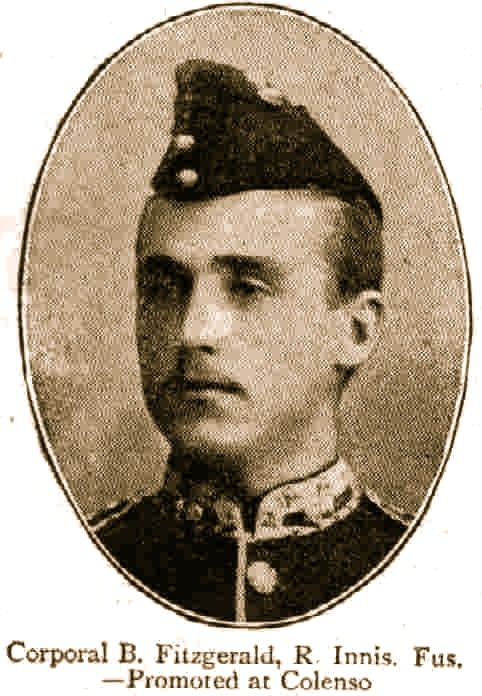Radcliffe on Trent WWI Letters
Bernard Patrick Fitzgerald
Bernard Fitzgerald, born 1880, enlisted in the Royal Inniskilling Fusiliers in 1895, age fifteen, following in the footsteps of his Irish father and regular soldier Francis Fitzgerald. He fought in the Boer War and was awarded a Distinguished Conduct Medal for the actions he describes below. War injuries meant that he was unfit to serve abroad in WWI; he was a reservist in the U.K. He died in October 1918 at Nottingham War Hospital (Saxondale) in the parish of Radcliffe on Trent. He is buried in Radcliffe cemetery.
Click here to read more about Bernard Patrick Fitzgerald
Letters to Ellen Fitzgerald, mother, written Dec. 26th 1899
“Well, mother, it is a mystery to me how I am alive to-day. On the day of the battle (Colenso) I had many a narrow shave. I was knocked over twice by the bursting of cannon balls at my side. My helmet was knocked off by a piece of shell, but I came out of it without a scratch. As for bullets, they were flying round us like hailstones for hour after hour. When we were lying down you could see the dirt that the bullets knocked up. I shall never forget the day as long as I live. The first few minutes of action makes you queer, I can tell you. Then you don’t take any notice of it. I was laughing and joking just the same as if I was sitting down in that dear old corner at No. 14, Alexander Road [his home].
I risked my life that day. I went for the reinforcements and I dressed the wounds of fellows in the firing line while the shot and shell were flying. I was near being taken prisoner, only the Boer who had me was a decent sort of chap. He was able to speak English, and we had a few words together.
Well mother, I am highly recommended by my colonel to the general officers commanding for my services that day on the field. I don’t know what my reward will be. Perhaps I won’t hear anything about it for a year or so. The colonel told me he could not express in words what he thought of me for my coolness under fire and the way I assisted him in every possible manner that day in the carrying out of his orders. I stuck with him everywhere.
Even if I get nothing it is all right to know that the colonel and all the officers think of me as a brave lad. I will die contented on the battlefield as long as I have done honour to the old name of Fitzgerald, and kept up the credit of the drummer-boys of our Army. Although I am only a drummer-boy I have shown them that the good old Irish blood is in my veins.
When the battle was over I went down to the Tugela, and could have drunk it dry — I was so thirsty! I had given away by own water-bottle to a poor chap who was dying and he said ‘God bless you!’ It was an awful sight to see the men dying on the field, some praying, and others saying a few farewell words to chums. One poor fellow said to me, ‘Tell my mother I am dying like a soldier.’ Everybody died bravely fighting. Out of fifteen in my tent only six of us came out of the battle safely.
I remain, your loving son
B Fitzgerald”
December 30th 1899
Just a few lines to let you know how I am getting on. I have been promoted corporal. The General said I was too young to made sergeant. I may be able to distinguish myself again some time during the war. I cannot make it out – it did not seem as if I was on a battlefield at all that day. When we were coming in the Colonel said, ‘I don’t know how you escaped so well, Fitzgerald.’ I was such a mark for the Boers running about the field with the C.O. that I had to put my bugle in my haversack because it shone so in the sun, and I had to throw my canteen away.
Your loving son
B Fitzgerald
December 30th 1899
Just a few lines to let you know how I am getting on. I have been promoted corporal. The General said I was too young to made sergeant. I may be able to distinguish myself again some time during the war. I cannot make it out – it did not seem as if I was on a battlefield at all that day. When we were coming in the Colonel said, ‘I don’t know how you escaped so well, Fitzgerald.’ I was such a mark for the Boers running about the field with the C.O. that I had to put my bugle in my haversack because it shone so in the sun, and I had to throw my canteen away.
Your loving son
B Fitzgerald
(source: from the website of Ian Coghlan www.coghlan.co.uk)

